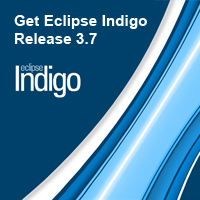| EGit 1.0 arrives with Eclipse Indigo |
| Written by Kay Ewbank | |||
| Tuesday, 05 July 2011 | |||
|
In line with the Eclipse policy of annual updates Version 3.7, known as Indigo, is now available. Improvements including features aimed at Java developers and better modelling technology. The new version has 10 pre-defined packages to make Indigo easy to download and use, though there’s no Eclipse for PHP Developers Package. Java developers WindowBuilder, (an Eclipse-based GUI builder) is an Eclipse open source project.
(Click to enlarge) They also get EGit 1.0, which means they can use Git for source code management. Egit isn't included by default in the pre-defined Java/JEE package, so needs to be added as a separate step. Eclipse. EGit is built on top of JGit, an implementation of Git in Java. Ian Bull in the EclipseSource blog suggests that newcomers to Git check out the book Pro Git or the Eclipse EGit tutorial for beginners. Other Java developer features include the ability to work with Maven projects directly from Eclipse, and support for Hudson build monitoring directly from the Eclipse workspace. Eclipse Modeling has also been improved. The Xtext language development framework now includes the ability to create domain-specific languages (DSLs) with embedded Java-like expressions, along with Xtend, a code generation language that produces Java code and allows tightly integrated code generation into the Eclipse tooling environment. Xtend supports constructs including both static and injected dynamic extensions, smart string processing, polymorphic method dispatching, and type inference. Database developers will benefit from the inclusion of a model repository that integrates with several NoSQL databases including Objectivity/DB, MongoDB, and DB4O. Those of you working on distributed systems get support in the new version of EMF (Eclipse Modeling Framework) 2.7. The updated version lets you replicate changes across distributed systems more cleverly: a client can send back to the server a minimal description of what's been changed rather than sending back the whole, arbitrarily-large, new instance. EMF Compare 1.2 brings dedicated UML support and is more fully integrated with the SCM, and a new project called EMF Facet allows extension of an existing Ecore metamodel without modification. The Eclipse runtime has a number of improvements, including support for multi-tenant JPA (Java Persistence API) Entities. Multi-tenancy is a term used in cloud computing to mean the ability to run multiple customers on a single software instance installed on multiple servers so you can improve resource utilization by allowing load balancing among the ‘tenants’. This addition to Eclipse means you can include JPA persistency if you’re writing SaaS-style applications. Another improvement is the implementation of the OSGi 4.3 specification in Equinox 3.7, including use of generic signatures, generic capabilities, and requirements for bundles. In case you are wondering what happened to the PHP Developers Package (PDT) then the news is that it isn't included because of the lack of a package maintainer! You can still install the relevant modules using the usual Install New Software feature. The lack of a package lowers the visibility of PDT and might well see its popularity on the wane. You can download the various Eclipse packages from www.eclipse.org/downloads.
<ASIN:0596100655> <ASIN:1430218339> <ASIN:0321603788> <ASIN:0321553462> <ASIN:0321288157> <ASIN:1430218835> <ASIN:0321534077> |
|||
| Last Updated ( Monday, 02 July 2012 ) |


